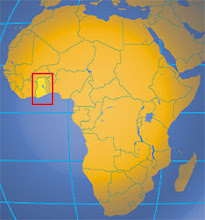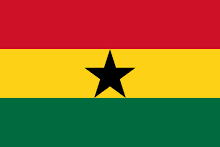One thing that will help the financial situation is the favorable exchange rate from Dollars to Cedis. Last year, the exchange rate was 1 to 1. This morning I bought cedis at 1 to 1.43. To my surprise, prices don’t seem to have inflated at all. Everything is the same, if not cheaper, than it was a year ago. It’s nice to catch a break on that.

After exchanging currency, Akunz took me around Accra to look for some of the materials that will be difficult to find in the north. It's obvious where the US has left its mark on Ghanaian culture. This is a billboard along a major street in the city.
We stopped briefly at a warehouse selling drip irrigation supplies. They offer a half acre system out-of-the-box for about 600 cedis. While this is what we need, I’m hesitant to simply buy a “project” from a private vendor and then turn it over to the farmers in Yua. Serving as humanitarian delivery boys does no exactly meet the rigorous engineering challenges characteristic of this organization.

Our next stop was the Solar Light Company. They have a website advertising a household solar system for 2500 cedis. That’s less than our current solar budget, so I thought I’d at least give it a look. As it turns out, the system they refer to on the website includes just two 100 watt panels. Even if you could buy all the components of the system for 2500 cedis, which you can’t, a 200 watt array is not half of what’s necessary to power any reasonably sized home.
There were, however, some components they offered for an affordable rate. The charge controller, batteries, and lights were all comparable to what we’d pay in the US. Panels here go for around 9 cedis per watt. That would be about 9000 cedis for the size array that is actually needed for the system I have in mind. We’ll be much better off shipping our own panels over for around $1500.
I took* dinner this evening with Akunz and his family. Dr. Akunzule is a veterinary doctor, born in Yua, and educated at Cornell University in the US. He is a well respected elder in both his home village and in Accra, where he currently resides. Akunz’s claim to fame is that he was the first man in Ghana to perform surgery on a lion.
His daughter prepared a traditional meal of riceballs and groundnut soup. The soup contained bits of what appeared to be snake. I thought it might be rude to ask. Honestly though I didn’t want to know.
*Local idiom. You “take” meals rather than “have” them.
-John Yatsko


